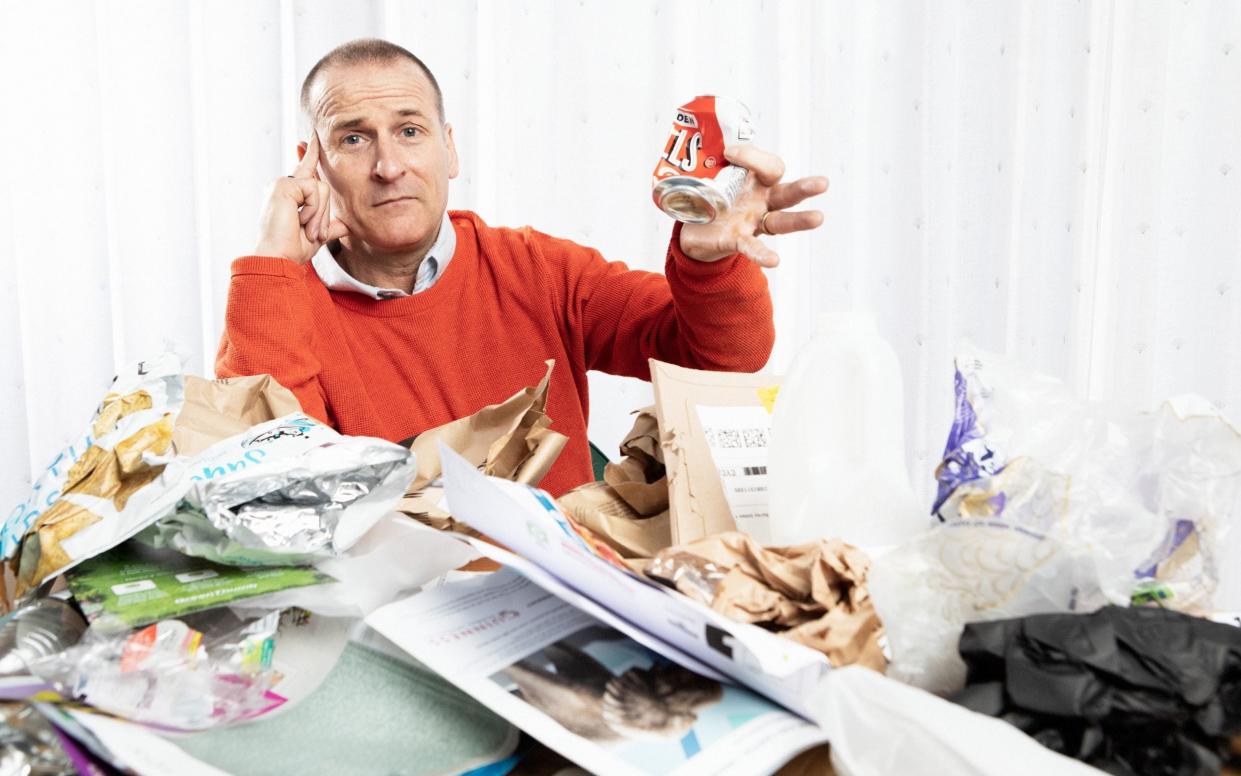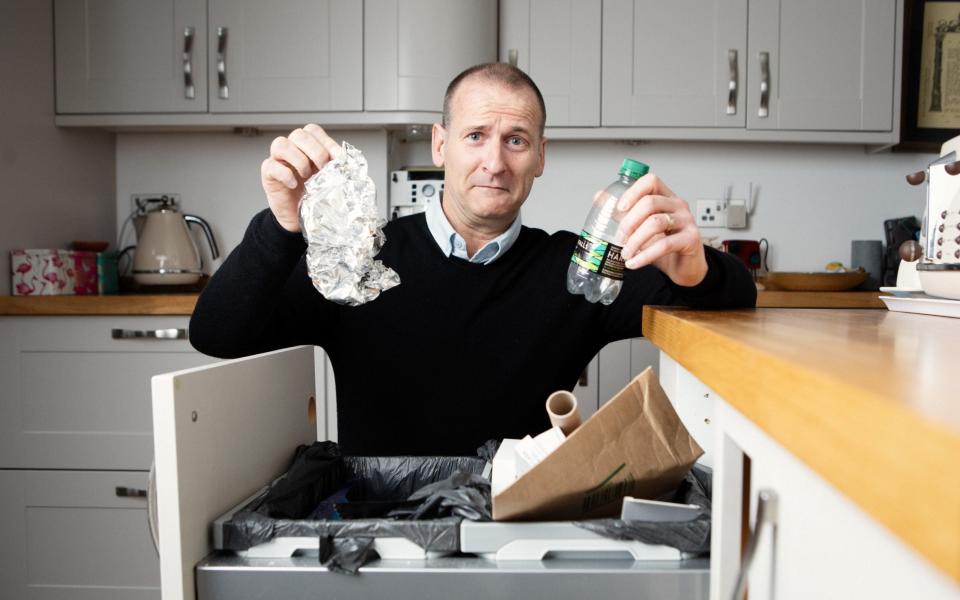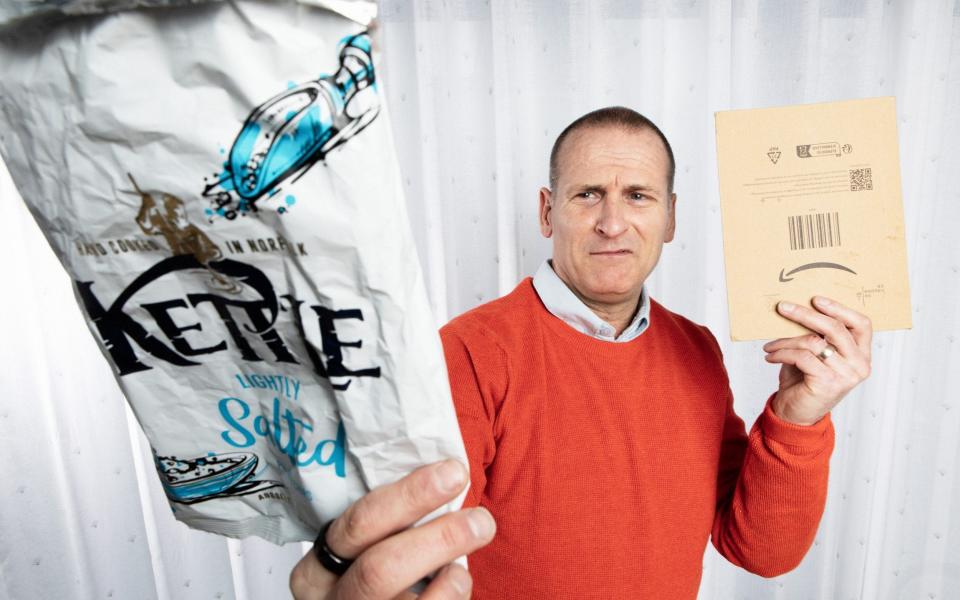When did the rules of recycling become so complex?

Several times a week, I trudge up the garden path with two black bin liners. In one are the recyclables: the bottles, tins, newspapers and various bits of plastic that I assume can be reused, but for all I know are sent off to Vietnam or the Philippines and made into food for turtles.
In the other is everything else, which will most likely be incinerated, or buried in a vast hole somewhere by the side of the M3 where it will gently rot away for the next 500 years. In truth, I am blissfully unaware of the fate of my own waste.
I empty the recycling detritus into the “good” green wheelie bin and the general waste into the “bad” black bin and walk away with a smug eco-halo over my head, safe in the knowledge that I’ve done my bit for the planet, and that Mole Valley District Council will do the rest by collecting it all and sorting it accordingly.
Occasionally, I have heated discussions with my wife about whether or not to clean foil food containers before placing them in the recycling bin (if all your recyclables go in a single bin, you should, to reduce contamination), and I sigh when I visit my 80-year-old father, for whom recycling is still a newfangled idea. At home, I toss many items into the green bin more in hope than certainty that they will be recycled.

Bin befuddlement
I’m not alone in my ignorance. Only 8 per cent of Brits believe recycling labelling on products is clear. Add to that the fact that councils across the country have different guidelines and systems, and you have a recipe for bewilderment. No wonder, then, that up to 60 per cent of the rubbish that ends up in the nation’s general waste bins could in fact be recycled.
Depending on the waste recycling facilities of your local authority, you may have any number of different bins for any number of materials. In Bristol, for example, things get technical. They have five different bins, and the binmen sort cans from plastics at the roadside. In Wales, it’s even more complex. Their bins come in a rainbow of colours, which is why the country is second best in Europe and third in the world for household waste recycling.
My simplistic binary bin routine could soon be changing if new rules are introduced. Under a proposed shake-up of household-waste regulations designed to create a more uniform system, all homes could soon need as many as seven bins.
The controversial proposals are due to be made public in the next two weeks. It is expected that local authorities will be mandated to collect food waste weekly, offer a free garden-waste service, and collect glass, metal, plastic, paper and cardboard for recycling, as well as general rubbish.
The plans have been called “madness” by some MPs. If adopted, they will create a uniform system of recycling management across the country, in theory making the current piecemeal system more consistent, and thereby increasing recycling rates.
It is feared that they will cost councils hundreds of millions of pounds – a cost that campaigners demand should not be passed on to taxpayers. The likelihood, however, is that the costs will be passed on to producers, instead of consumers and residents.
The scheme has been described as the “national bin service” and devised as the result of a government consultation on household and business recycling. A report on the consultation is due to be published next month.
Contradictory rules
Bin befuddlement has become part of the English psyche, caused largely by contradictory recycling rules between local authorities. For many, the idea of a new regime where waste must be sorted into half a dozen or more different containers will cause anxiety, yet proponents of the system, if introduced, argue it will make things simpler for everyone.

To see what can be achieved, one need only look to Germany, where our Teutonic cousins have become über-recyclers and regularly top the global league for the most waste recycled, followed closely by Austria, Wales, Switzerland, the Netherlands and South Korea.
Germany has topped the league by introducing policies such as mandatory sorting of different types of waste and introducing an efficient deposit-refund scheme. Many policies are longstanding, such as the Green Dot system, which was introduced in 1991 and forced manufacturers to place a green label on certain packaging, indicating it must be accepted by recycling facilities.
Good intentions
There’s no shortage of desire to recycle in the UK, however. A 2020 survey by campaign group Recycle Now found that nine out of 10 UK households regularly recycle, and more were prepared to further change their lifestyle to help the environment. So, why do we lag behind, and why is there so much confusion about recycling?
According to James Piper, an environmental consultant and author of The Rubbish Book, more consistent and clearer messaging is needed. “People are interested in stories,” he says.
“For example, if your Pyrex jug breaks, you can’t put it in the glass recycling bin because the melting point of Pyrex is much higher than a glass bottle. That is easier to remember than focusing on different types of glass and their chemistry make-up. Likewise, it is easier to remember that anything smaller than a tennis ball is difficult to sort and recycle.
“I am a big advocate for the right number of bins to maximise the materials collected whilst reducing contamination. Ask people in the street if they think we should collect food waste weekly, or collect flexible film plastic, or collect cans and reduce contamination so more can be recycled – everyone will say yes. The only way you can do that is by having more bins, so you can separate more materials.
“Wales is one of the best recyclers in the world, and that’s because they focus on sorting recycling at the kerbside, through more bins and better collections. They have a lot of consistency. We should be looking to Wales for inspiration, rather than Germany.

